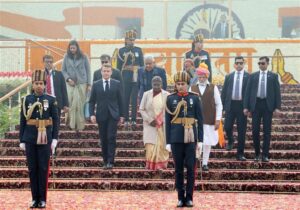
President of India, H.E. Mrs. Droupadi Murmu lead the Nation in celebrating the 75th Republic Day from Kartavya Path in New Delhi on January 26, 2024. French President H. E. Mr. Emmanuel Macron was the Chief Guest at the parade, which showcased India’s rich cultural diversity, unity & progress; its military prowess on the back of increasing indigenous capabilities, and the growing Nari Shakti.
Based on the twin themes of ‘Viksit Bharat’ and ‘Bharat – Loktantra ki Matruka’, this year’s parade was witness the participation of around 13,000 Special Guests – an initiative which will provide an opportunity to people from all walks of life to take part in the celebrations and encourage Jan Bhagidari in this national festival.
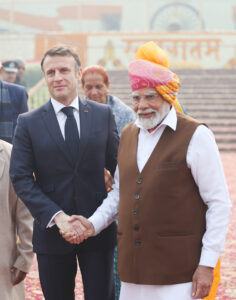
For the first time ever, the parade was heralded by over 100 women artists playing Indian musical instruments. The parade was commenced with the music of Sankh, Naadswaram, Nagada, etc. also played by these women artists. It was also witnessed the maiden participation of an all-women Tri-Service contingent marching down the Kartavya Path. Women pilots were also enthrall the audience during the Fly-past, representing Nari Shakti. The contingent of the Central Armed Police Forces (CAPF) was also consisted of only women personnel.
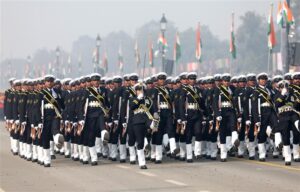
The parade
The Republic Day parade was commenced at 1030 hrs and run for duration of approx. 90 minutes. The ceremony was startd with the visit of Prime Minister of India, H.E. Mr. Narendra Modi to the National War Memorial; where he was lead the nation in paying solemn tributes to the fallen heroes by laying a wreath. Thereafter, the Prime Minister and other dignitaries were headed to the saluting dais at Kartavya Path to witness the parade.
The arrival of the President of India and her French counterpart were escorted by the President’s Bodyguard – ‘Rashtrapati Ke Angrakshak’. The President’s Bodyguard was the senior most Regiment of the Indian Army. This Republic Day was special for this elite Regiment as the ‘Angrakshak’ have completed 250 years of service since its raising in 1773. The two Presidents were arrived in the ‘Traditional Buggy’, the practice which is making a comeback after a gap of 40 years.
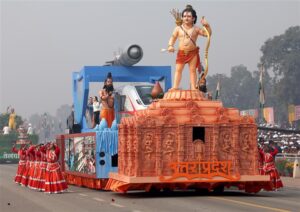
As per tradition, the National Flag was unfurled followed by the National Anthem with a booming 21-gun salute given with indigenous gun system 105-mm Indian Field Guns. Four Mi-17 IV helicopters of 105 Helicopter Unit was showered flower petals on the audience present at Kartavya Path. That was followed by ‘Aavaahan’, a band performance by over 100 women artists played various types of percussion instruments, symbolising Nari Shakti.
The parade was then commenced with the President taking the salute. The parade was commanded by Parade Commander, Lieutenant General Bhavnish Kumar, General Officer Commanding, Delhi Area, a second-generation Army officer. Major General Sumit Mehta, Chief of Staff, HQ Delhi Area was the Parade Second-in-Command.
The proud winners of the highest gallantry awards were followed. That includes Param Vir Chakra winners Subedar Major (Honorary Captain) Yogendra Singh Yadav (Retd) & Subedar Major Sanjay Kumar (Retd), and Ashok Chakra winners Major General CA Pithawalla (Retd), Colonel D Sreeram Kumar & Lt Col Jas Ram Singh (Retd). The Param Vir Chakra was awarded for the most conspicuous act of bravery and self-sacrifice in the face of the enemy, while the Ashok Chakra was awarded for similar acts of valour and self-sacrifice but, other than, in the face of the enemy.
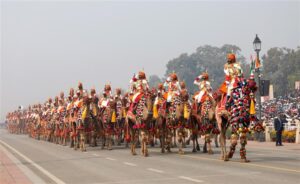
French Contingent
Kartavya Path was witnessed to a march past by a combined Band and Marching contingent of the French Armed Forces. A 30-member band contingent was headed by Captain Khourda, which was followed by a 90-member marching contingent, led by Captain Noel. One Multi-Role Tanker Transport aircraft and two Rafale fighter jets of the French Air & Space Force was fly above the contingents while they march past the saluting dais.
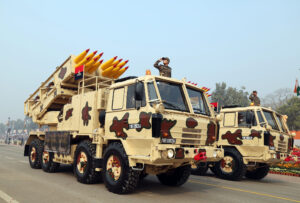
Indian Army Contingent
The first Army contingent lead the Mechanised Column was of 61 Cavalry, led by Major Yashdeep Ahlawat. Raised in 1953, the 61 Cavalry was the only serving active Horsed Cavalry Regiment in the world, with the amalgamation of all the ‘State Horsed Cavalry Units’. It was followed by 11 Mechanised Columns, 12 marching contingents, and a fly past by Advanced Light Helicopters of Army Aviation Corps.
Tank T-90 Bhishma, NAG Missile System, Infantry Combat Vehicle, All-Terrain Vehicle, Pinaka, Weapon Locating Radar System ‘Swathi’, Sarvatra Mobile Bridging System, Drone Jammer System, and Medium Range Surface-to-Air Missile System among others was the main attractions in the mechanised columns.
Marching down the Kartavya Path for the first time would be an all-women Tri-Service contingent, led by Captain Sandhya of Military Police, with three supernumerary officers Captain Sharanya Rao, Sub Lieutenant Anshu Yadav & Flight Lieutenant Shrishti Rao, and an all-women Armed Forces Medical Services contingent, headed by Major Srishti Khullar with Captain Amba Samant of Army Dental Corps, Surgeon Lieutenant Kanchana of Indian Navy & Flight Lieutenant Dhivya Priya of Indian Air Force.
The Army Marching Contingents was including The Madras Regiment, The Grenadiers, Rajputana Rifles, Sikh Regiment and the Kumaon Regiment.
Indian Navy Contingent
The Indian Navy contingent was consisted of 144 men and women Agniveers, led by Lt Prajwal M as Contingent Commander and Lt Mudita Goyal, Lt Sharvani Supreiya & Lt Devika H as Platoon Commanders. It was followed by the Naval Tableau, depicting the themes ‘Nari Shakti’ and ‘Sea Power Across the Oceans Through Indigenisation’.
The first part of the tableau showcases the women in the Indian Navy in All Roles and in All Ranks across the Navy while the second depicts the very first indigenous Carrier Battle Group, comprising the Aircraft Carrier Vikrant, her highly capable escort ships Delhi, Kolkata and Shivalik, the Light Combat Aircraft and Advanced Light Helicopter, the Kalvari Class Submarine and the GSAT-7, Rukmani Satellite.
Indian Air Force Contingent
The Indian Air Force (IAF) was comprised 144 airmen and four officers, led by Squadron Leader Rashmi Thakur. Squadron Leaders Sumita Yadav & Pratiti Ahluwalia and Flight Lieutenant Kirti Rohil was marched past as supernumerary officers behind the Contingent Commander. The IAF tableau was the theme ‘Bharatiya Vayu Sena: Saksham, Sashakt, Aatmanirbhar’.
The tableau depicts LCA Tejas and Su-30 flying over the IOR, and a C-295 transport aircraft being flown by women aircrew in the cockpit. The GSAT- 7A positioned on the tableau represents the IAF’s incorporation of space technology in its operations. The tableau shows that IAF has been at the forefront of rendering humanitarian aid, both within and across borders.
Veterans’ Tableau
Another highlight of the parade was the Veterans’ Tableau on the theme ‘Rashtra Nirmaan: Pehle Bhi, Ab Bhi, Aage Bhi aur Hamesha’. It was showcased the bravery and sacrifices of the Ex-servicemen in the service of the nation.
DRDO Tableau & Equipment
Many critical systems/technologies developed by DRDO were showcased during the parade. As an enabler of ‘Aatmanirbharta’, the valuable contribution of women scientists of DRDO in core areas of Defence Research has been significant. The DRDO tableau were based on the theme ‘Women power in protecting the nation by providing the defence shield in all 5 dimensions namely Land, Air, Sea, Cyber, and Space’.
Women’s involvement in Defence R&D was prominently highlighted in the tableau. Outstanding Scientist Smt Sunita Devi Jena was the Contingent Commander, with Smt P Laxmi Madhavi, Smt J Sujana Choudhary and Smt A Bhuvaneswari also presented on the tableau. The tableau displays Man Portable Anti-tank Guided Missile (MPATGM), Anti-Satellite (ASAT) Missile, Agni-5, Surface-to-Surface Ballistic Missile, Very Short Range Air Defence System (VSHORADS), Naval Anti-Ship Missile–Short Range (NASM-SR), Anti-Tank Guided Missile ‘HELINA’, Quick Reaction Surface-to-Air Missile (QRSAM), Astra, Light Combat Aircraft ‘Tejas’, ‘Uttam’ Active Electronically Scanned Array Radar (AESAR), Advanced Electronic Warfare System ‘Shakti’, Cyber Security systems, Command Control Systems and the Semi Conductor Fabrication Facility.
Indian Coast Guard
The Indian Coast Guard (ICG) contingent was led by Assistant Commandant Chunauti Sharma followed by officers of the guard Assistant Commandants Priya Dahiya, Hardik and Pallavi. The ICG, with a fleet of 154 ships & 78 aircraft, is capable of countering threats at & to the sea. It was also the nodal agency for coordinating Maritime Search & Rescue in 4.6 million square km Indian Search & Rescue Region. It has saved about 11,516 lives at sea since inception which translates to saving one life every second day.
Contingents of CAPF & Delhi Police
The contingents of Central Armed Police Forces (CAPF) and Delhi Police were led by women personnel. Border Security Force marching contingent was headed by Assistant Commandant Monika Lakra; Central Industrial Security Force by Assistant Commandant Tanmayee Mohanty; Central Reserve Police Force by Assistant Commandant Megha Nair; Indo-Tibetan Border Police by Assistant Commandant Moniya Sharma; Sashastra Seema Bal by Deputy Commandant Nancy Singla; and Delhi Police by Additional Deputy Commissioner of Police Shweta K Sugathan.
The Camel Contingent of Border Security Force was led by Deputy Commandant Manohar Singh Kheechee. For the second time, female camel riders on their decorated camels were taken part in the parade.
NCC Contingents
Various contingents of the NCC was witnessed female representation. For the first time, there was all-girl Tri-Service Marching contingent, which was headed by Senior under Officer Tanu Tevatia of Uttar Pradesh Directorate. The Girls marching contingent (Army), comprising 148 cadets, was led by Senior under Officer Punnya Ponnamma from Karnataka & Goa Directorate. The NCC band was also having an all-girl representation. The Combined Band consisting of Girls from Birla Balika Vidya Peeth Pilani, Rajasthan and North-Eastern Region was headed by Senior under Officer Yashasvica Gaur and Ankita Sharma.
NSS contingent
Two hundred (200) female volunteers was form the National Service Scheme (NSS) contingent. It was led by Ragina Tamang from Sikkim, Regional Directorate of NSS, Guwahati.
Tableaux
Tableaux of 16 States/Union Territories (UTs) will roll down the Kartavya Path, showcasing India’s rich cultural diversity and creativity. These are:
| S No | State/UT | Theme | |
| 1 | Arunachal Pradesh | Bugun Community Reserve – Viksit Bharat | |
| 2 | Haryana | Mera Parivar – Meri Pehchan | |
| 3 | Manipur | Thambal Gi Langla – Lotus Threads | |
| 4 | Madhya Pradesh | Self-Reliant Women – Mantra of Vikas | |
| 5 | Odisha | Women Empowerment in Viksit Bharat | |
| 6 | Chhattisgarh | ‘Aadim Jansansad of Bastar Muria Darbar’ | |
| 7 | Rajasthan | Viksit Bharat Main – Padharo Mahare Desh | |
| 8 | Maharashtra | Inspiration for Indian Democracy: Chhatrapati Shivaji Maharaj | |
| 9 | Andhra Pradesh | ‘Transforming School Education in Andhra Pradesh – Making Students Globally Competitive | |
| 10 | Ladakh | Viksit Bharat: Empowering Women Through Employment in Ladakh’s Journey | |
| 11 | Tamil Nadu | Kudavolai System in Ancient Tamil Nadu – Mother of Democracy | |
| 12 | Gujarat | Dhordo: A Global Icon of Gujarat’s Border Tourism | |
| 13 | Meghalaya | Meghalaya’s Flourishing Tourism | |
| 14 | Jharkhand | Jharkhand’s Tasar Silk | |
| 15 | Uttar Pradesh | Ayodhya: Viksit Bharat – Samradh Virasat | |
| 16 | Telangana | Democracy at the Grassroots: The legacy of Telangana’s Freedom Fighters |
In addition, nine Ministries/Departments/Organisations will display their achievements and progress through innovative tableaux. These are:
| S No | Ministry/Deptt/Organisation | Theme | |
| 1 | Indian Space Research Organisation (ISRO) | Chandrayaan 3 – A Saga in the Indian Space History | |
| 2 | Council of Scientific and Industrial Research (CSIR) | Purple Revolution through Scientific Interventions of CSIR | |
| 3 | Ministry of Electronics and Information Technology | Responsible AI for Social Empowerment | |
| 4 | Ministry of Ports, Shipping & Waterways | Sagarmala | |
| 5 | Indo-Tibetan Border Police, Ministry of Home Affairs, | Vibrant Villages | |
| 6 | Ministry of External Affairs | Success of the G-20 Summit | |
| 7 | Election Commission of India | India – Mother of Democracy | |
| 8 | Central Public Works Department (CPWD) | ‘Central Vista – Viksit Bharat Ka Partibimb’ | |
| 9 | Ministry of Culture | Bharat: Mother of Democracy |
Vande Bharat 3.0
For the third consecutive year, Ministry of Defence and Ministry of Culture was presented a cultural extravaganza ‘Vande Bharatam’ on the theme ‘Cultural expression of women power – accomplishment through resolve’. Around 1,500 female dancers were mesmerised the audience with a colourful performance, giving the message of unity in diversity. The grand performance includes 30 folk dance styles uniquely prevalent in different states, as well as contemporary classical dance and Bollywood styles. The artists include tribal dancers, folk dancers, and classical dancers.
Motorcycle Display
The women personnel of CRPF, BSF & SSB was exhibitd the country’s Nari Shakti by carrying out daredevil stunts during the motorcycle display. Over 260 women were showcased their bravery, valour and determination through varied formations, including Chandrayaan, Sarvatra Suraksha, Abhivadan and Yog Se Siddhi.
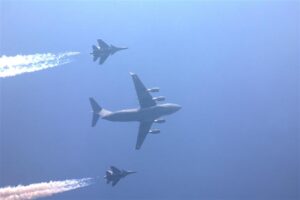
Fly-past
And then the eyes were shifted from Kartvyapath to the sky where IAF’s most eagerly awaited ‘Fly-past’ was commenced with a breath-taking air show by 54 aircraft/helicopters. These include three aircraft from the French Air & Space Force, 46 from the Indian Air Force, one from the Indian Navy, and four helicopters from the Indian Army.
Vintage as well as modern aircraft such as Light Combat Aircraft ‘Tejas’, Rafale, Su-30, MiG-29 Upgrade, P-8I, Jaguar, Dakota, Dornier, C-17, C-130J as well as Light Combat Helicopter ‘Prachand’, Advanced Light Helicopters and Apaches was displayed various formations, including Tejas, Netra, Varuna, Vajraang, Trishul, Amrit, Prachand, Arjan and Tangail. The concluding Vertical Charlie maneuver was performed by a Rafale fighter aircraft. The ceremony was culminated with the national anthem and the release of Tri-colour balloons.
As the nation was celebrated 75th Republic Day, a number of unique activities had been organised. The details are given below:
Special Guests
Around 13,000 Special Guests invited to witness the parade this year include best performers in various fields and those who made best use of various schemes of the Government such as Pradhan Mantri Awas Yojana (Rural & Urban), PM Ujjwala Yojana, PM Street Vendor’s Aatmanirbhar Nidhi (PM SVANidhi), PMKrishi Sinchayee Yojana, PM Fasal Bima Yojana, PM Vishwakarma Yojana, PM Anusuchit Jaati Abhyuday Yojna, PM Matsya Sampada Yojana, Stand-Up India scheme, Pre-Matric Scholarship Scheme and Rashtriya Gokul Mission. Sarpanches of Vibrant Villages, women workers of Swachh Bharat Abhiyan, Electronic Manufacturing sectors & Central Vista Project, women Space Scientists of ISRO, Yoga Teachers (Ayushman Bharat), winners of international sports events and Paralympic medalists
In addition, Best Self-Help Groups, Farmers Producer Organisations, references of PM Mann ki Baat programme, and ‘Super-100’ of Project Veer Gatha 3.0 & winners of National School Band Competition will attend the parade. These special guests will be prominently seated at Kartavya Path.
Anant Sutra
The Ministry of Culture was showcasing ‘Anant Sutra – The Endless Thread’ textile installation at Kartavya Path during the parade. It was installed behind the spectators seated in the enclosures. Anant Sutra is a visually-stunning tribute to the saree, India’s timeless gift to the world of fashion. This unique installation was showcased nearly 1,900 sarees and drapes from every corner of the country, mounted at a height with wooden frames along the Kartavya Path. It was have QR codes which can be scanned to know the details about weaving and embroidery arts used in it.
National School Band Competition
The Ministry of Defence, in collaboration with Ministry of Education, conducted a National School Band Competition at All-India level for Republic Day Celebrations 2024 in order to evoke feelings of patriotism, unity and evoke a deep sense of pride among the school children towards their country. The Grand Finale of the competition took place at Major Dhyan Chand National Stadium, New Delhi on January 21 & 22, 2024. PM SHRI School Jawahar Navodaya Vidyalaya, Suratgarh, Sriganganagar, Rajasthan; St. Teresa’s Higher Secondary School, Kannur, Kerala; Droupadi Girls High School, Nishaposi, Mayurbhanj, Odisha and Govt. Sr. Secondary School, West Point, Gangtok, Sikkim were declared winners in Pipe Band Boys, Brass Band Girls, Pipe Band Girls and Brass Band Boys categories respectively.
Veer Gatha 3.0
The third edition of Project Veer Gatha was organised as a part of Republic Day Celebrations 2024 to inspire and spread awareness among children about the gallant deeds and sacrifices of the Armed Forces. The event was organised by Ministry of Defence in collaboration with Ministry of Education between July 13 to September 30, 2023. A record 1.36 crore students from 2.42 lakh schools pan-India participated in Veer Gatha 3.0. A total of 100 school students called ‘Super-100’ were declared as winners. They were felicitated by Raksha Mantri Shri Rajnath Singh and Education Minister Shri Dharmendra Pradhan in New Delhi on January 25, 2024.

